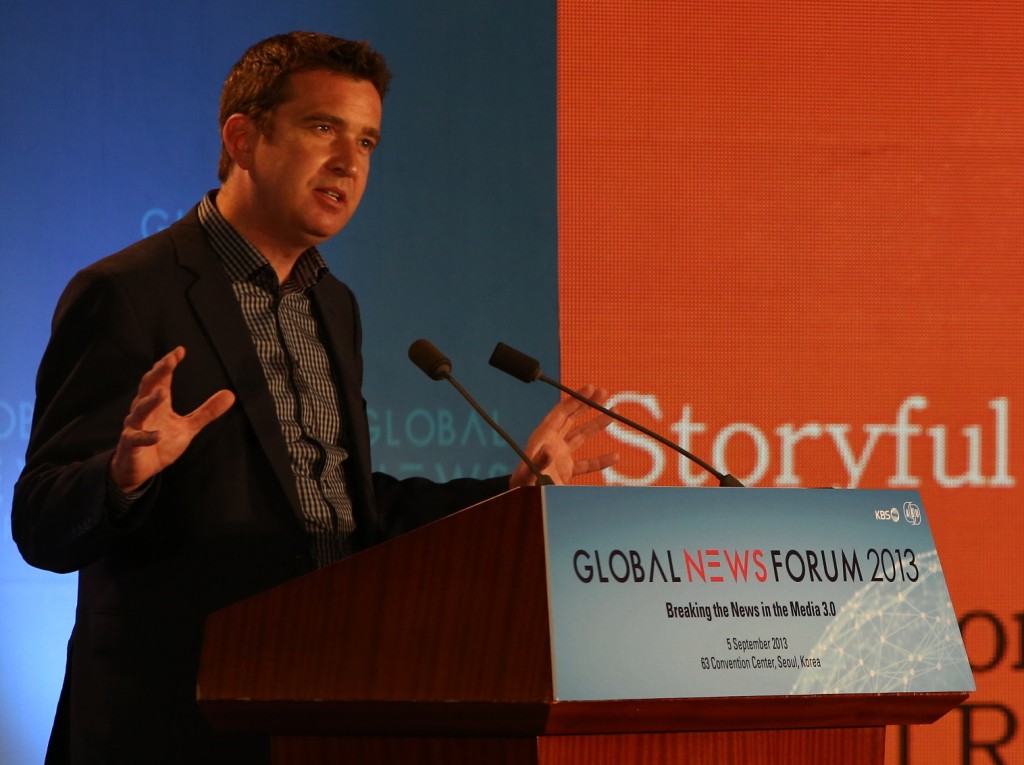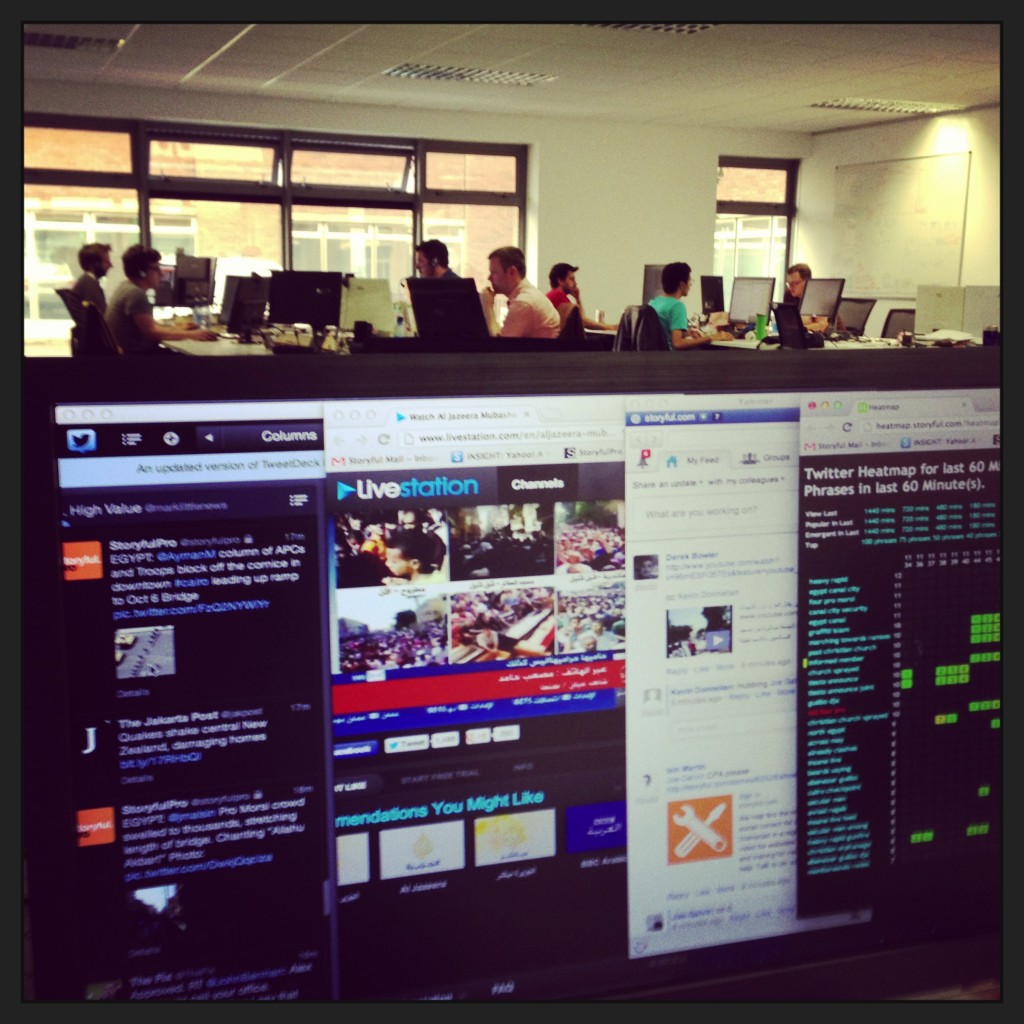People Who Innovate – Mark Little, Storyful
 Irish journalist Mark Little quit his job as a prime time news anchor in late 2009 to found Storyful, a news service with a twist. Like traditional news agencies, Storyful delivers news content to media organizations. The novelty is that this content is culled from social media networks such as Twitter, YouTube and Facebook. Storyful journalists comb social media networks for interesting or dramatic videos, photos or other items. The information is then verified and put into context before being made available to the company’s subscribers (see here for how Storyful verifies stories from Syria).
Irish journalist Mark Little quit his job as a prime time news anchor in late 2009 to found Storyful, a news service with a twist. Like traditional news agencies, Storyful delivers news content to media organizations. The novelty is that this content is culled from social media networks such as Twitter, YouTube and Facebook. Storyful journalists comb social media networks for interesting or dramatic videos, photos or other items. The information is then verified and put into context before being made available to the company’s subscribers (see here for how Storyful verifies stories from Syria).
Three years since it was founded, Storyful has attracted some major clients, including ABC, Al Jazeera and the New York Times, and generated hundreds of articles about its innovative take on news gathering – though the company has yet to break even. DW Akademie’s Kate Hairsine talks to Mark Little about why he started up a social media news agency in the first place, his belief in journalism and why he thinks journalists can make great entrepreneurs.
Where did the idea for Storyful come from?
I was a foreign correspondent for the Irish national TV station, RTE. In about 2009, I realized the job being done by professional journalists was increasingly being done by ordinary people, by people with camera phones which enabled them to share pictures and essentially create journalism. I realized that this was the opportunity to join forces with these newly empowered citizens and tell stories about the world. But the problem is as soon as everyone can tell a story, who do you listen to? A hundred hours of video are now uploaded to YouTube every single minute. How do you find the video that actually shapes the great stories of our time? I realized that the only way to do that was to bring professional journalists back in to manage this overabundance of information. They would be the ones that would add context and shape the stories around these incredible images coming from places like Syria. So I thought, “let’s break the old news agency model, let’s start again from scratch” and that’s where Storyful came from.
Weren’t you concerned about leaving your safe job with a national broadcaster to become an entrepreneur?
Some people said to me later they thought I was leaving because I had had a nervous breakdown. I was leaving a well-paid job as the anchorman for the evening news program and it was a nice cushy lifestyle that I easily could have gotten used to. But I imagined my child 20 years later asking me, “what did you do Dad when you had that great idea?” and answering “nothing” – that would have been worse than falling flat on my face trying. I realized I wanted to be able to answer, “I tried”. On the other hand, it was also survival. I wanted to create a sustainable business model for the journalism that inspired me when I was a kid. And if I don’t do it, who else is going to do it? I think we all have a personal responsibility right now not to moan about the problems facing journalism. Instead, let’s do something and create something.
What skills did you bring with you that helped in founding a news agency?
Storyful was conceived so it wasn’t just about news; it is about stories and storytelling. Being Irish, I think we have a particular tradition of storytelling, it is something in my DNA. I had also been a foreign correspondent and I had been self sufficient. I had essentially been an entrepreneur in the field because I had set up the first Washington bureau for my station and I had been on my own in very tough situations. Getting up in front of a group of investors is far less scary when you have been shot at in Afghanistan. These experiences gave me the confidence to just do it. They also gave me a sense of vision. I had spent 20 years believing in journalism and that is a pretty infectious thing.
Where there times that you stood up in front of a group of investors and thought, “oh dear, I wish I knew more about business”?
I can’t count the amount of times that I have sat in rooms full of people who have MBAs and I just shut up because I didn’t know what they were talking about and that is still the case today. But I think one of the great things about being an entrepreneur and a journalist is that they are very complementary. They are both about leadership and about vision. Once you have those skills, you can learn everything else. You can’t learn vision and leadership. They are things that are built into journalism and that is what makes journalists potentially great entrepreneurs.
Foreign correspondents aren’t renowned for their teamwork though – aren’t they too individualistic to inspire a team?
As a foreign correspondent, you are incredibly driven and egoistical to a certain extent. But at the same time, you have to have certain skills of persuasion to get your team to get in the jeep to follow you to the frontline or get on the plane with you where there is a risk of dying. So I have never felt there’s a contradiction between the two because that is also what business is about – it is about egotistical people with missions who manage to bring people with them.
It’s normal now to see YouTube videos and Twitter photos being used by serious news organizations but this is quite a recent phenomenon. How difficult was it three years ago to find investors for your idea of a social media news agency?
When I was leaving my previous job someone said, “you just said the word tweet on air” as if I had said an expletive. I remember thinking there was an underdeveloped notion of what was going on. It was of course much more difficult to try to raise half a million euro in Ireland in 2009 and 2010 when the country was going off the cliff. But at the same time, investors aren’t looking to imitate what is going on: they are looking for the next new thing. From that point of view, it wasn’t that difficult to persuade people who are by nature disruptive to invest in an idea where there was no market, there was no product, there were no landmarks and no precedent. There was nothing. There was just the sense of vision.
How are you making money?
We have built up a subscription model so we have news organizations around the world who pay us a monthly fee to discover and verify the most valuable content on the social web. This can be big news events but also trends that are catching fire on social media. In the past year, we have also developed a content licensing model. When we find a particularly compelling video that we think has the capacity to attract millions of views, we work in partnership with the uploader to make as much money as possible. We do that by revenue share on platforms such as Yahoo, AOL and MSN. We also do it by selling content though our partners and getting as many views as possible. And finally YouTube themselves have helped us build a business through managing the most compelling videos on their platform.
What kind of mistakes did you make when you first started?
One of the key mistakes you will make is picking the wrong people who don’t necessarily share your vision. People who don’t share your vision should not be on the journey with you and that is something that you don’t realize sometimes until it is too late. I think the other thing I realized was to be true to yourself. I would take decisions because I felt someone with more experience of business was advising me to do it even it didn’t feel right in my gut. All of the mistakes I have made are the things that didn’t feel true to me.
You say it’s important to employ people who share your vision. What kind of people are working for you?
We have 30 people working for us in Dublin, Atlanta (in New York State) and in Hong Kong. The vast majority are journalists. We have some old broadcasters like myself but we tend to find those who are the most adept when they come into Storyful are younger sub-editors who have worked in production, the kind of people who have worked catching mistakes for news organizations or newspapers. They are social media natives, who pay attention to detail and can tell you where the punctuation should go but are also good storytellers. They are the new breed of journalists who are going to thrive – people who are not afraid of change, who are slightly pedantic, who are innovative but also ambitious and aggressive.
What are you personally getting out of Storyful?
To be honest, the biggest sense of achievement I have right now is not building Storyful but is building the team that built Storyful and inspiring people. I was 41 when I started Storyful. It wasn’t like I was a 15 year old in the basement inventing this technology. I have a wife, I have kids. I mortgaged my house and we lived on nothing. I didn’t get paid for a while and I had been very well paid. I think essentially asking them to come on the journey with me was really difficult. Other people have made sacrifices because they believed in what I told them and at times, they have suffered as well. So on a personal level, now we are three years in, I want to reward the people who believed in me. In addition, I am very proud to be part of a movement that I think will emerge, not from Silicon Valley or New York, but probably from Nairobi or Singapore. And if one person in Kenya or Burma or Brazil sees the example of Storyful and goes and founds a company, that is a better tribute than anything I could have got as a journalist.
Interview: Kate Hairsine
1 Comment





Guy | Friday 2013-10-18
Very interesting interview Kate.
There’s also a PDF eBook on social media newsgathering on Storyful’s blog, edited by Claire Wardle.
http://blog.storyful.com/wp-content/uploads/2013/02/SocialNewsgather.pdf